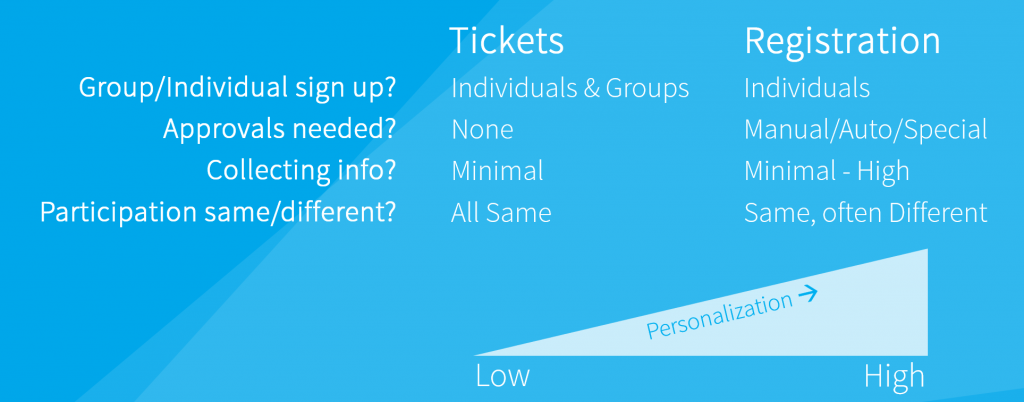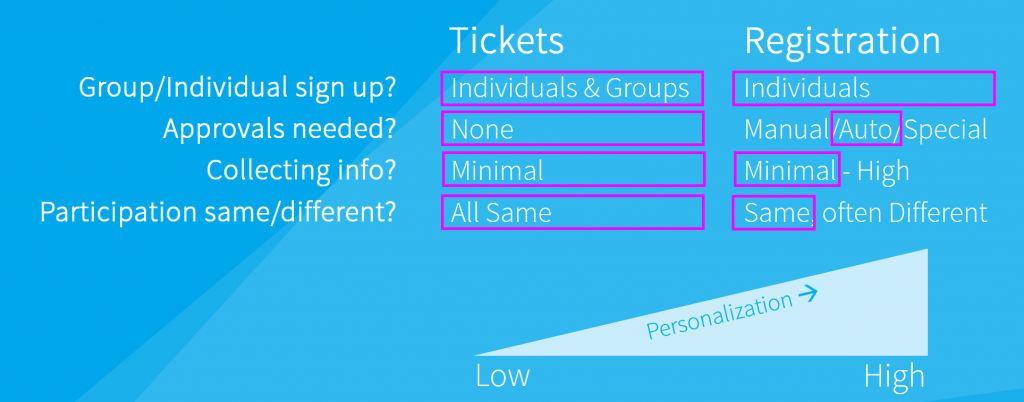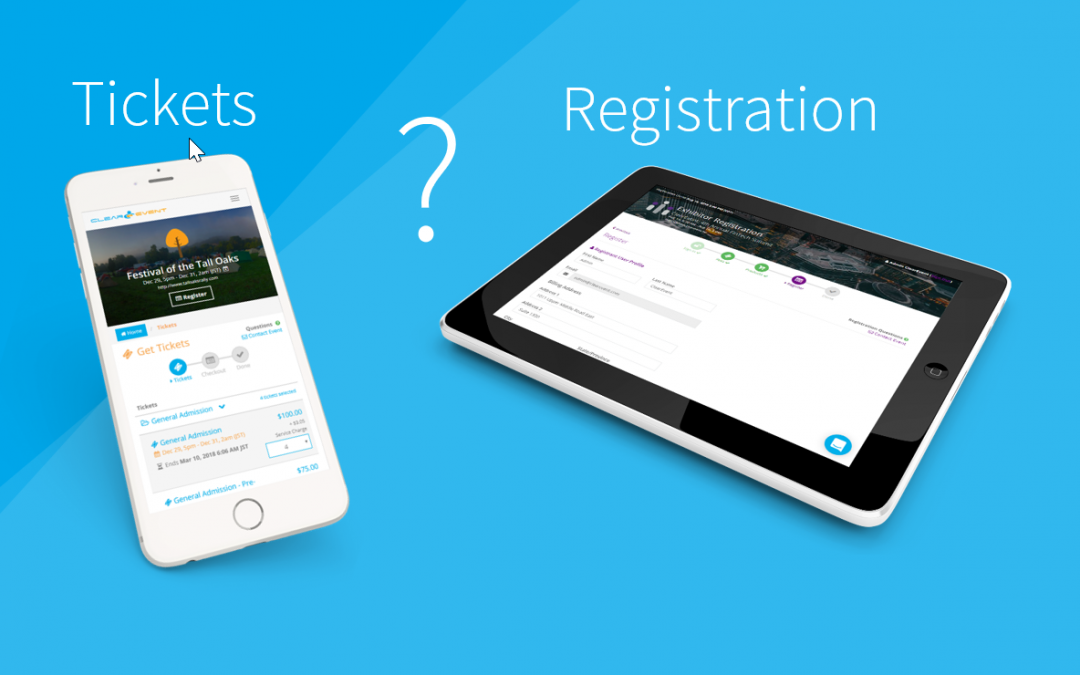Deciding between tickets and registration is confusing. It’s hardly surprising because tickets and registration are similar in some ways and quite different in others.
In this first of a three part series of short articles, I’ll clarify the difference between tickets and registration. In Part 2, I’ll show you when to use tickets or registration. In Part 3, I’ll show you what to look for in an online ticket and/or registration system.
Let’s start with the basics for tickets and registration.
Tickets and Registration: Let’s break it down
An Online Ticket System allows you to:
- create and publish your tickets
- sell tickets online and accept payments
- collect information from ticket buyers
- send purchased tickets and a receipt to the buyer
- receive the revenue from ticket sales in your bank account
- provide you with key reports and status information about ticket sales.
An Online Registration System allows you to:
- create and publish your registration forms
- accept online registrations and payments
- collect information from registrants
- send registration confirmation and a receipt to the buyer
- receive the revenue from registrations in your bank account
- provide you with key reports and status information on your registrations.
They sound pretty similar, right?! No wonder it’s confusing!
Tickets and Registration: How to Decide?
Some event planners use tickets and others use registration for the same situations because of the similarities between tickets and registration. However, for most situations, you’ll need to determine which is the better approach.
There’s an important difference between tickets and registration that is the key to deciding when to use tickets and when to use registration.
It comes down to Personalization
Decide between tickets and registration by considering how personalized is the attendee experience? The more you provide a personalized experience for attendees, the more registration will be the better option for you.
We can break personalization into four key factors which make it really easy to tell whether to use tickets or registration.
1) Individual or Group Signup?
Will you be signing up individuals or groups or both? Tickets work well for individual and group sign ups while registration is better for individual sign ups.
2) Signup Approvals
When someone signs up for your event, will they automatically be approved, or is there a manual review or curation process to determine if the applicant may attend your event? Automatic sign up can be used for both tickets and registration, whereas manual and special approval options only apply to registration.
Thinking about this from the attendee perspective, it is very unusual to purchase tickets but not be approved to attend the event. Tickets are always an automatic approval. On the other hand, it is quite common that registrations must be manually approved by organizers before an attendee is permitted to attend the event.
3) Collecting Information
To personalize the experience for each attendee, organizers collect information from their attendees when they sign up. This information allows organizers to provide the personalized experiences for participants and attendees based on the information they provide to the event.
Collected information may include any of the following examples:
- Contact info
- Company info
- Background
- Experience
- Preferences
- Affiliations
- Interests
- Event-related selections
Registration works great for collecting information.
Many ticket systems only have limited ability to collect of information for each ticket holder. This is intentional because ticket buyers expect a fast purchase experience. The ticket buyer may not have, or may not be willing to enter, all the information you request about each ticket holder.
The more information you collect from your attendees, the more registration will be the better option for you by a wide margin. If you’re collecting limited or no information, tickets or registration could be used.
4) Attendee Participation
Events have many different types of attendees such as audience members, delegates, exhibitors, volunteers, performers, VIP’s and event staff. Think about the level of personalization for each of these participant types. It varies from no personalization to a very personalized experience for the attendee, depending on the type of attendee.
For example, audience members participate in the event in much the same way after entering the event.
When the level of personalization is low, use tickets.
On the other hand, each delegate can select their own combination of activities offered by the event. Each delegate’s participation is personalized to them. In this scenario, it’s not sufficient for delegates to all have the same entry ticket as each delegate selected and paid for a combination of event selections such as courses, tours and so on.
When personalization is high, use registration.
Tickets and Registration Table
To make it easy for you, these key aspects of personalization are organized in a helpful table below. For each type of attendee coming to your event, use the table to determine the overall degree of personalization and whether tickets or registration will be better.
The table helps you quickly clarify whether tickets or registration is better.
When most of the answers fall under ‘Tickets’, (i.e. on the low end of personalization) use tickets for that type of participant. Likewise, when most of your answers fall under ‘Registration’, (i.e. not on the low end of personalization) then use registration.
The table also helps you see when it’s not clear which to use, and why it’s not clear. For example, ticketed attendees can have personalized badges, registration may collect almost no information, ticketed attendees may have some personalized participation based on ticket type. If you have answers in both columns, go with the column with the most answers.
Some may say the choice between tickets and registration comes down to the capabilities of your online tickets and registration system. Not true! Don’t use a ticket system for registration and vice versa. More on selecting a system in Part 3.
Show me some examples!
Let’s look at examples using tickets and/or registration. We’ll start with a simple example you may be familiar with, where tickets and registration both work. Then in Part 2 we’ll look at when it is better to use one over the other. Lastly, we’ll look at an example of using both tickets and registration for different purposes in the same event.
Example 1. When Tickets and Registration Both Work
When personalization is low, it is perfectly ok to use tickets or registration.
Consider the following example. Signing up attendees to attend a seminar. No additional information is collected from attendees. Attendees will sign up as individuals and possibly a few small groups. As an organizer, you just need to know who had paid and is coming. Attendees just want to know they are signed up and have proof of payment and admission.
Tickets or registration both work in this situation.
Why is this true? It’s because the degree of personalization is low. The following marked up table makes it clear.
Answers for each of the four factors fall under Tickets AND Registration. So, for this scenario, either approach could be used.
If both tickets and registration are an option, go with the method that is simpler for your attendees
The signup experience is somewhat similar when tickets or registration is used. However, even in this simple case, tickets will be simpler for your attendees, especially for people who are signing up for a group of people. (More about attendee experience in Part 2.) So, while both could be used, tickets is a better option based on the possible need to sign up small groups.
So, not all events are like the simple example above. And we don’t want to just memorize all the situations when registration is better than tickets and vice versa! Fortunately, by using our handy table, you don’t have to.
In Part 2 Tickets and Registration: When to use them? we’ll show examples of when to use tickets, when to use registration, and when to use both for different parts of the same event.
Interested in other topics?
As an event planner, knowing what options are available to you is key. Let us know the topics you’d like to hear about that could help your event planning success, at support@clearevent.com.
In the meantime, happy planning!
